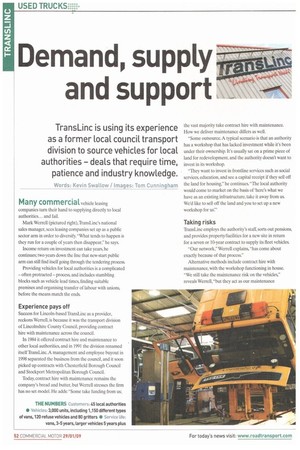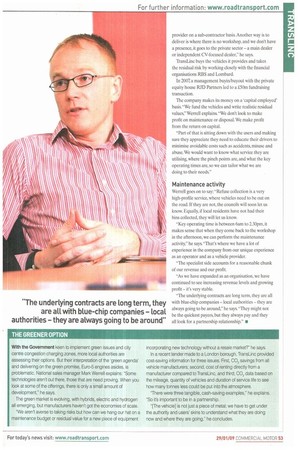emand, supply and support
Page 52

Page 53

If you've noticed an error in this article please click here to report it so we can fix it.
Many commercial vehicle leasing companies turn their hand to supplying directly to local authorities.., and fail.
Mark Werrell (pictured right),TransLinc's national sales manager, sees leasing companies set up as a public sector arm in order to diversify. "What tends to happen is they run for a couple of years then disappear," he says Income return on investment can take years, he continues; two years down the line that new-start public arm can still find itself going through the tendering process.
Providing vehicles for local authorities is a complicated — often protracted — process. and includes stumbling blocks such as vehicle lead times, finding suitable premises and organising transfer of labour with unions, before the means match the ends.
Experience pays off
Success for Lincoln-based TransLinc as a provider, reckons Werrell, is because it was the transport division of Lincolnshire County Council, providing contract hire with maintenance across the council.
In 1984 it offered contract hire and maintenance to other local authorities, and in 1991 the division renamed itself TransLinc. A management and employee buyout in 1998 separated the business from the council, and it soon picked up contracts with Chesterfield Borough Council and Stockport Metropolitan Borough Council.
Today, contract hire with maintenance remains the company's bread and butter, but Werrell stresses the firm has no set model He adds: "Some take funding from us; the vast majority take contract hire with maintenance. How we deliver maintenance differs as well.
"Some outsource. A typical scenario is that an authority has a workshop that has lacked investment while it's been under their ownership. It's usually sat on a prime piece of land for redevelopment, and the authority doesn't want to invest in its workshop.
"They want to invest in frontline services such as social services, education, and see a capital receipt if they sell off the land for housing," he continues. "The local authority would come to market on the basis of 'here's what we have as an existing infrastructure, take it away from us. We'd like to sell off the land and you to set up a new workshop for us'."
Taking risks
TransLinc employs the authority's staff, sorts out pensions, and provides property/facilities for a new site in return for a seven or 10-year contract to supply its fleet vehicles.
"Our network," Werrell explains. "has come about exactly because of that process."
Alternative methods include contract hire with maintenance, with the workshop functioning in house. "We still take the maintenance risk on the vehicles," reveals Werrell, "but they act as our maintenance provider on a sub-contractor basis. Another way is to deliver is where there is no workshop, and we don't have a presence, it goes to the private sector — a main dealer or independent CV-focused dealer," he says.
TransLinc buys the vehicles it provides and takes the residual risk by working closely with the financial organisations RBS and Lombard.
In 2007, a management buyin/buyout with the private equity house RID Partners led to a £50m fundraising transaction.
The company makes its money on a 'capital employed' basis. "We fund the vehicles and write realistic residual values," Wen-ell explains. "We don't look to make profit on maintenance or disposal. We make profit from the return on capital.
"Part of that is sitting down with the users and making sure they appreciate they need to educate their drivers to minimise avoidable costs such as accidents, misuse and abuse. We would want to know what service they are utilising, where the pinch points are, and what the key operating times are, so we can tailor what we are doing to their needs"
Maintenance activity
Werrell goes on to say: "Refuse collection is a very high-profile service, where vehicles need to be out on the road. If they are not, the councils will soon let us know. Equally, if local residents have not had their bins collected, they will let us know.
"Key operating time is between 6am to 2.30pm, it makes sense that when they come back to the workshop in the afternoon, we can perform the maintenance activity," he says. "That's where we have a lot of experience in the company from our unique experience as an operator and as a vehicle provider.
"The specialist side accounts for a reasonable chunk of our revenue and our profit.
"As we have expanded as an organisation, we have continued to see increasing revenue levels and growing profit — it's very stable.
"The underlying contracts are long term, they are all with blue-chip companies— local authorities — they are always going to be around," he says. "They might not be the quickest payers, but they always pay and they all look for a partnership relationship." •
























































































































































